Key takeaways:
- Design mentorship fosters a dynamic partnership based on trust, personalized feedback, and mutual growth.
- Mentorship in fashion empowers individuals to take risks, and provides valuable networking opportunities that can shape careers.
- Choosing the right mentor involves finding someone who resonates with your creative vision and values, not just their expertise.
- Open communication and embracing feedback are crucial for developing strong mentor-mentee relationships, enhancing the learning experience for both parties.
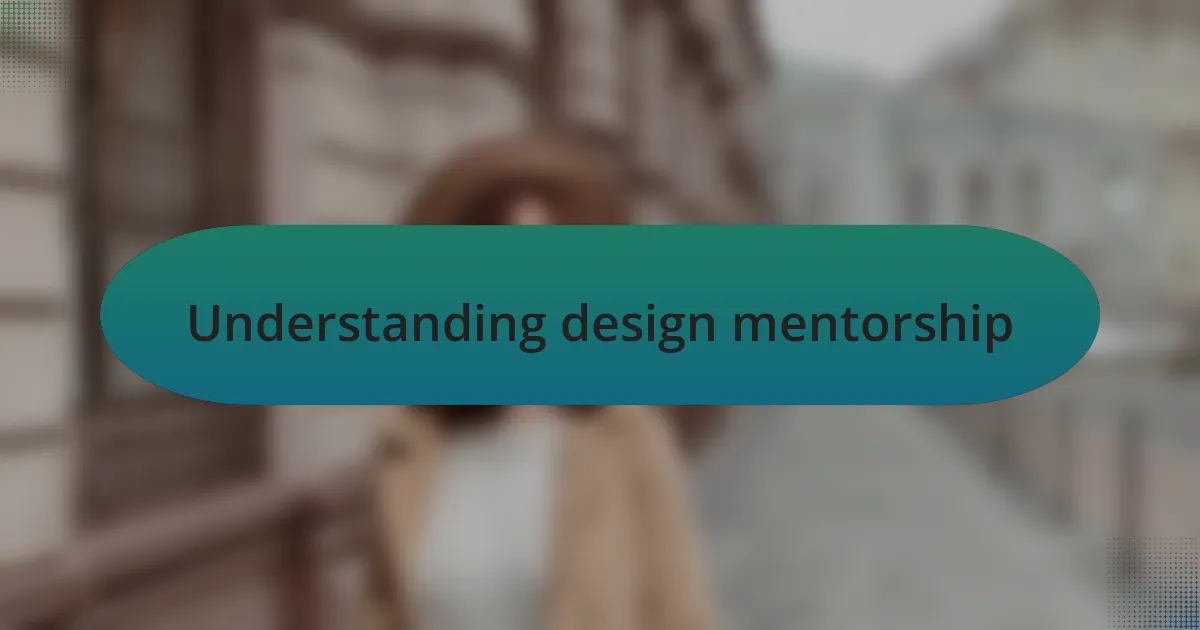
Understanding design mentorship
Design mentorship is a dynamic partnership that goes beyond just sharing skills; it’s about building a relationship rooted in trust and open communication. I recall working with a mentor who not only critiqued my designs but also shared stories of her own failures and successes, which made me feel more connected to her journey. Have you ever had someone guide you through a challenging situation, revealing insights that transformed your perspective?
The beauty of mentorship lies in its ability to provide personalized feedback tailored to an individual’s unique style and aspirations. I vividly remember a session where my mentor helped me reshape an entire collection based on my emotional connection to the fabrics I was using. That moment taught me how vital it is to understand not just the technical aspects of design but the narrative behind each piece.
It’s also important to recognize that mentorship is a two-way street. I often learned just as much from my mentor as she did from me; our discussions sparked new ideas and approaches. Have you considered how your own experiences can enrich the mentorship relationship? It’s in this fluid exchange that true growth happens, fueling creativity in ways that solo efforts often cannot achieve.
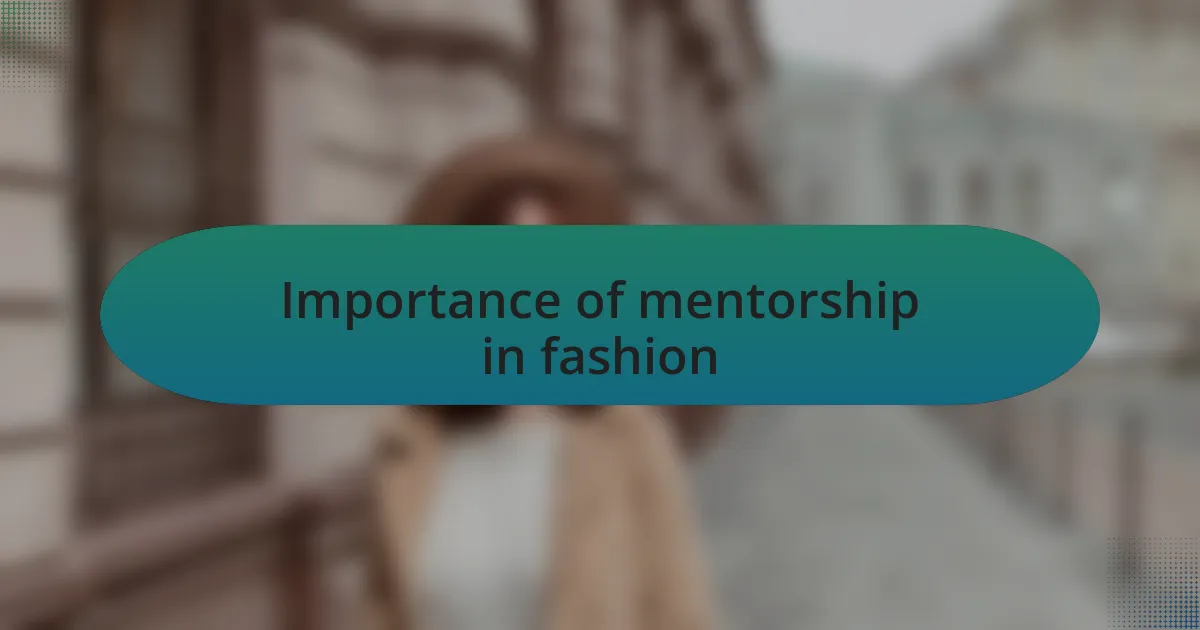
Importance of mentorship in fashion
The role of mentorship in fashion cannot be overstated. I remember attending a workshop where seasoned designers shared their journeys, illuminating the path through the myriad challenges we face in the industry. That shared knowledge was not just informative; it was comforting to know that others experienced similar obstacles. Have you ever felt the weight of uncertainty lifted just by hearing someone else’s story?
Mentors do more than just advise; they inspire confidence and encourage risk-taking. I had a moment when I was hesitant to present a bold design idea. My mentor urged me to trust my instincts, which ultimately led to a successful presentation. It made me wonder—how many creative breakthroughs do we miss because we’re afraid to step outside our comfort zones?
Another aspect I cherish about mentorship is the network it opens up. Through my mentor, I was introduced to potential collaborators who shared my passion for innovation. This type of connectivity is priceless—how could a single conversation lead to opportunities that change the course of your career? Each interaction reinforces the idea that mentorship is about building a community where creativity can flourish.
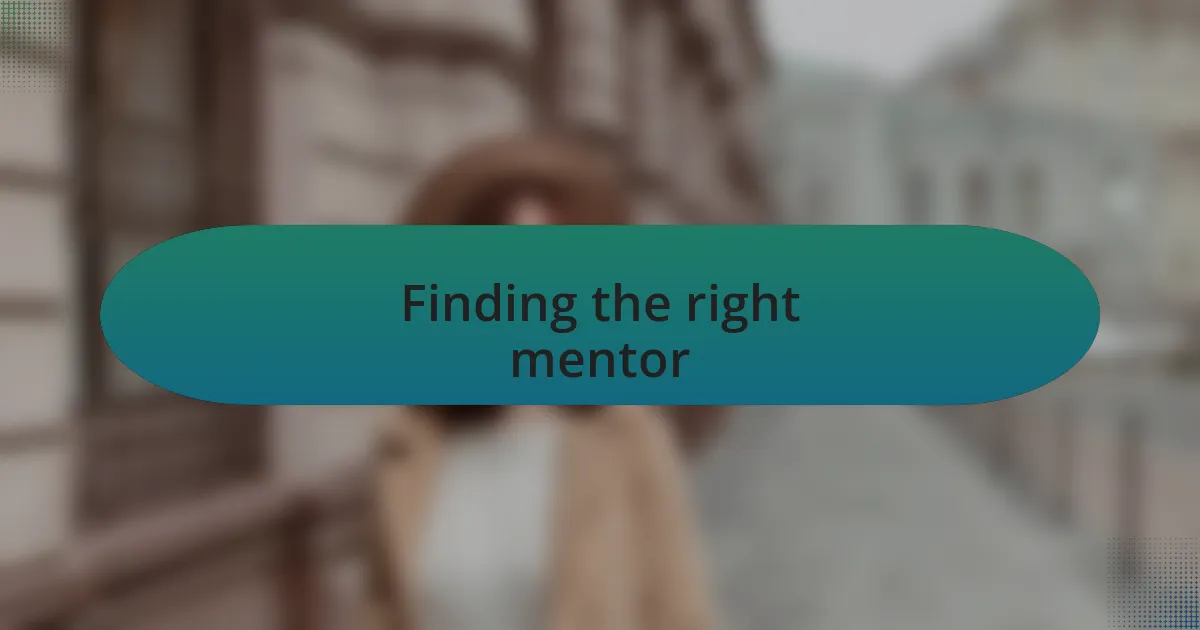
Finding the right mentor
Finding the right mentor can feel daunting, especially in a field as dynamic as fashion. I recall my early days, searching for someone whose vision resonated with mine. It’s not just about expertise; it’s about finding someone whose creative energy ignites a spark in you. Have you ever met someone who just gets your style? That instant connection can guide the course of your journey.
I remember a pivotal moment when I connected with a mentor who had an eye for detail that matched my own. During our brainstorming sessions, I could feel an electric synergy, as if we were building a bridge between our ideas. It was within that relationship that I discovered the power of a mentor who truly understands your artistic voice. How reassuring is it to have someone who champions your creativity while also challenging you to push boundaries?
Choosing a mentor isn’t just about skillset but about chemistry. I once passed on a potential mentor because, despite their impressive credentials, I felt disconnected from their approach. The right mentor should not only provide insight but also resonate with your values and aspirations. It made me reflect: do we sometimes overlook the emotional aspect of mentorship in pursuit of prestige? Finding that balance is essential for a fruitful relationship.
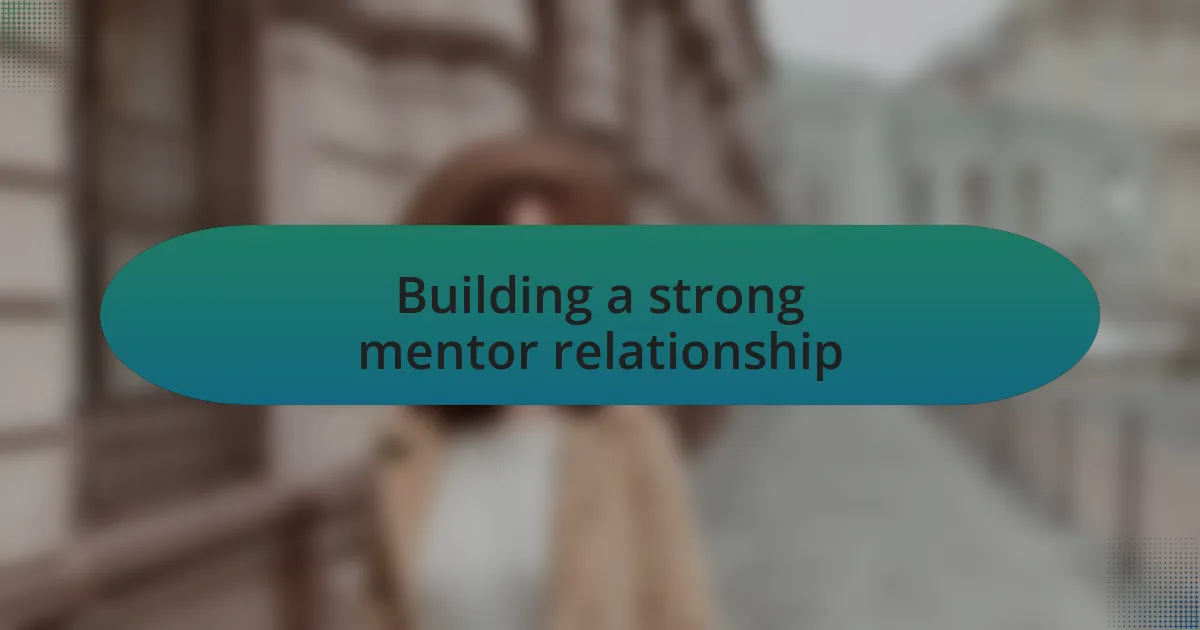
Building a strong mentor relationship
Building a strong mentor relationship begins with open communication. I learned this the hard way when I encountered a mentor whose feedback was often vague. It left me feeling more lost than guided. I realized early on that asking direct questions and expressing my needs could significantly enhance our interactions. Have you ever felt misunderstood simply because you didn’t voice your thoughts? A little clarity can make a world of difference.
Trust is the foundation of any meaningful mentorship. In my experience, I noticed that the more vulnerable I was about my struggles and aspirations, the more my mentor invested in my growth. I remember sharing a particularly tough design project, and instead of criticism, I received constructive advice that made me feel supported rather than judged. Isn’t it liberating to know you can be yourself and still receive guidance?
Finally, embracing feedback is crucial for nurturing the relationship. There was a time when I bristled at my mentor’s suggestions, thinking I knew better. But as I learned to genuinely accept and reflect on their insights, my skills refined dramatically. Have you ever dismissed advice only to realize its value later? It’s often in those moments of discomfort that we find the keys to our progress, deepening the mentor-mentee bond.
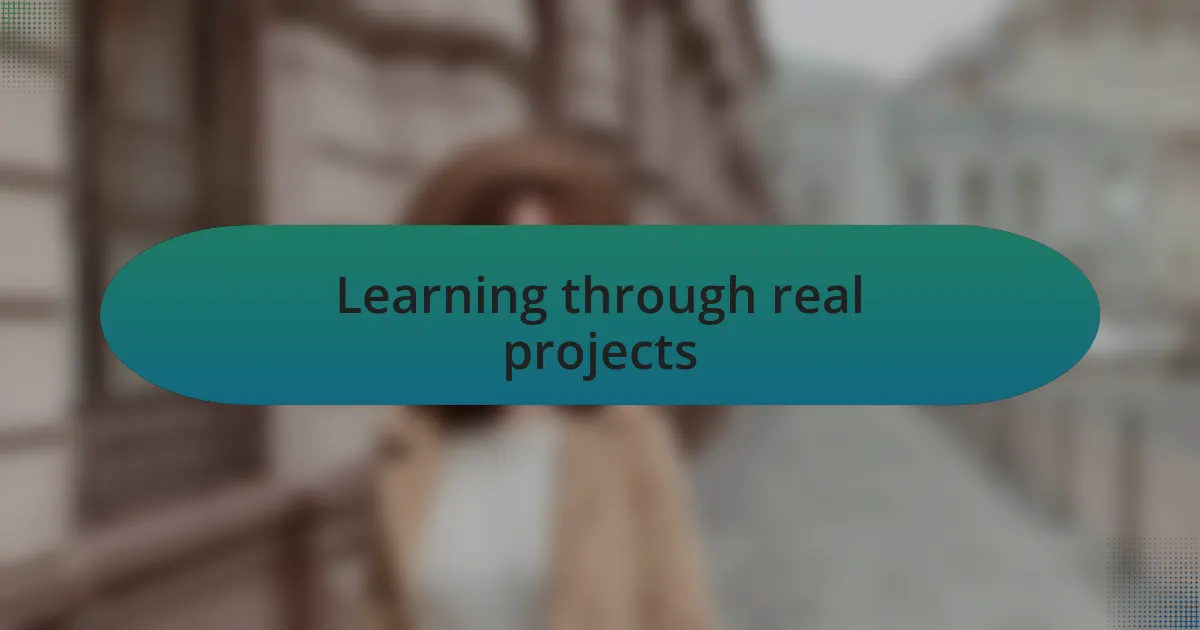
Learning through real projects
Engaging in real projects has been an eye-opening experience for my design journey. I recall working on a sustainable fashion line, collaborating with local artisans to source materials. This hands-on approach not only grounded my theoretical knowledge but also allowed me to witness the intricate relationships between design, ethics, and cultural significance. Have you ever worked on a project that caught you off guard with its complexities? I sure have, and those challenges offered some of my most profound learning moments.
One memorable project required me to redesign an existing collection based on customer feedback. As I plunged into the research, I discovered how pivotal real-world input is in shaping designs that resonate. What struck me most was how my mentor guided me in interpreting that feedback—not just as criticism but as a valuable dialogue between designer and consumer. It made me ponder: how often do we overlook the voices that can elevate our creations?
When I reflect on my journey, each real project has acted like a mirror, reflecting not just my design skills but also my personal growth. I faced moments of doubt, especially when juggling deadlines and creative blocks. Yet, each time I pushed through, I learned resilience and adaptability—traits that are essential in the fashion industry. Have you faced similar trials while honing your craft? Those experiences taught me that every project, successful or not, contributes to our evolution as designers.
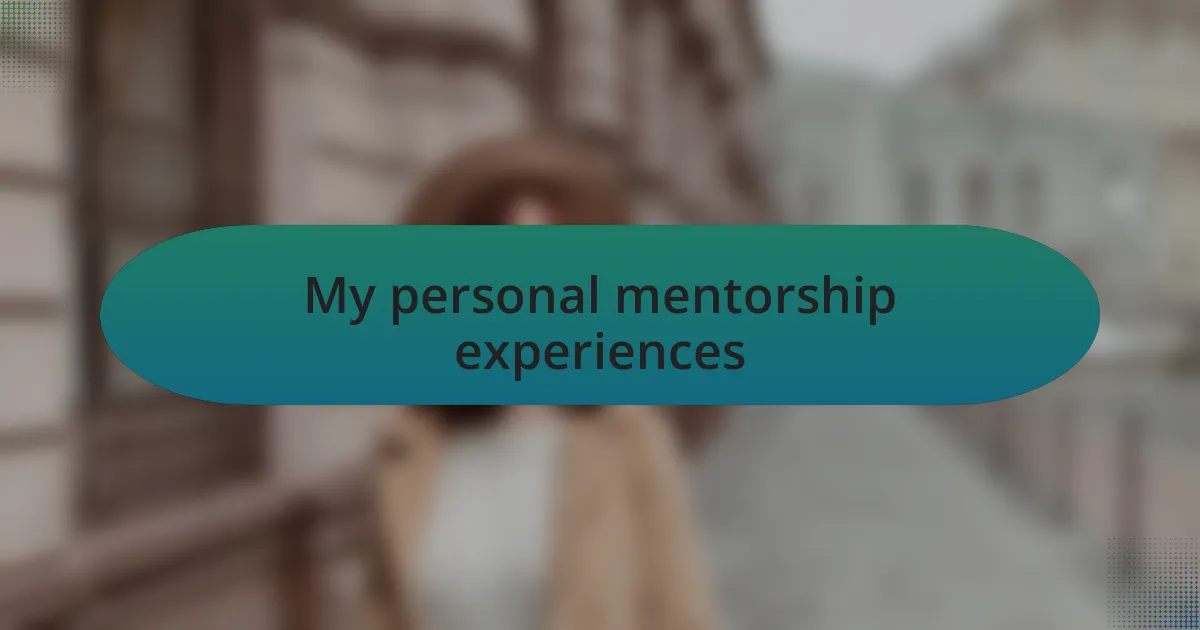
My personal mentorship experiences
My personal mentorship experiences often revolve around the unexpected lessons that unfold during creative work. I remember a specific instance where my mentor emphasized the importance of storytelling in design. While working on a casual apparel line, I struggled to find a cohesive narrative. My mentor’s passion for story-driven design inspired me to dig deeper into my own inspirations. It made me wonder: how can a piece of clothing tell a story that resonates? Once I understood this, my designs transformed—each garment became a chapter, and I felt more connected to my work than ever.
In another transformative encounter, my mentor challenged me to think critically about the materials I used. As I started experimenting with unconventional textiles, my comfort zone felt increasingly stretched. There was a moment of vulnerability when I realized my designs carried a deeper responsibility. Why was I so hesitant to embrace change? My mentor’s insights on sustainable practices illuminated a path where beauty and ethics could coexist seamlessly, which reshaped my approach to fashion design entirely.
Looking back, I see my mentorship experiences as catalysts for personal growth. I often faced imposter syndrome, questioning my choices and abilities. Yet, each conversation with my mentor becomes a safe space for reflection, encouraging me to embrace my unique perspective. Have you ever sought guidance and felt your confidence waver? Those dialogues not only fortified my skills but also reaffirmed my belief in the power of mentorship—it’s a partnership that nurtures creativity and self-discovery in ways I never anticipated.
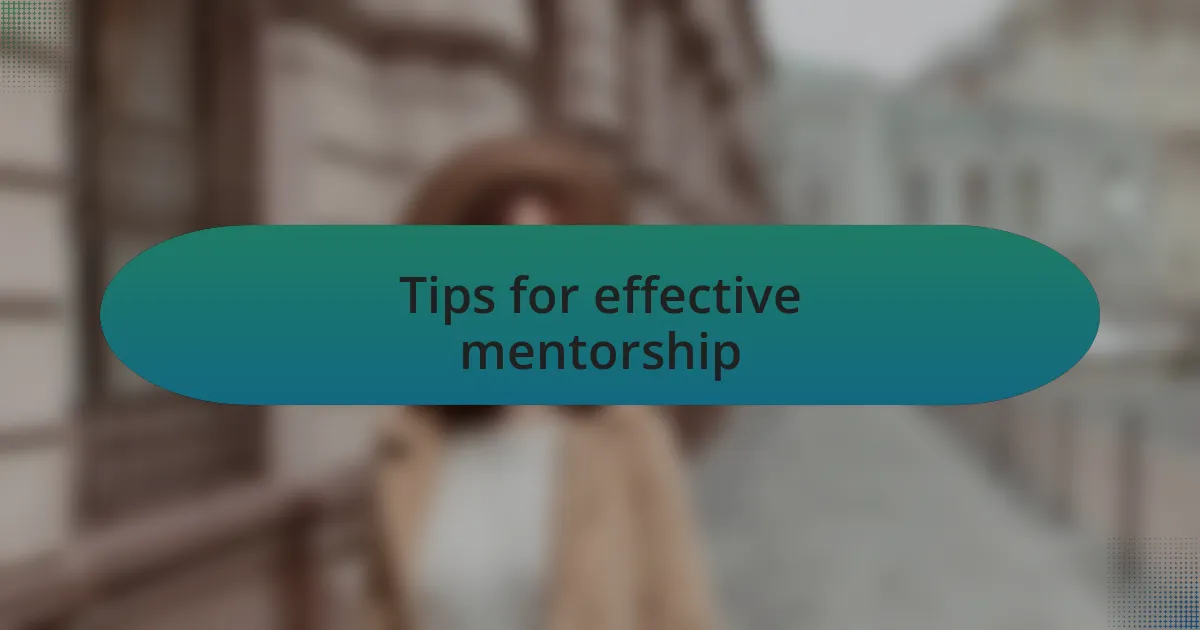
Tips for effective mentorship
One key to effective mentorship is establishing open communication. I remember sitting with my mentor after receiving feedback I didn’t quite understand. Instead of sulking, I asked probing questions. This simple act of inquiry not only clarified my doubts but also deepened my understanding of his perspective. Have you ever felt lost in a critique? By encouraging a dialogue, I found the feedback more constructive and supportive, creating a collaborative environment that fostered growth.
Another essential tip is to set clear expectations from the outset. In one of my mentoring relationships, we took time to outline our goals and the frequency of meetings. Having that framework allowed me to prepare adequately and remain accountable. It’s fascinating how structure can create a sense of security. Have you ever been unsure of what to expect from a mentorship? Defining those parameters did wonders for my focus, keeping our sessions targeted and productive.
Finally, I believe it’s crucial to be open to learning in both directions. As a mentee, I often assumed my mentor held all the answers. However, one day I shared a new technique I had learned, and to my surprise, he found it inspiring. It shifted our dynamic—it was a reminder that mentorship is a two-way street. How many times have you underestimated the value you bring to such relationships? Embracing that collaborative spirit can enhance both personal and professional growth in unbelievable ways.